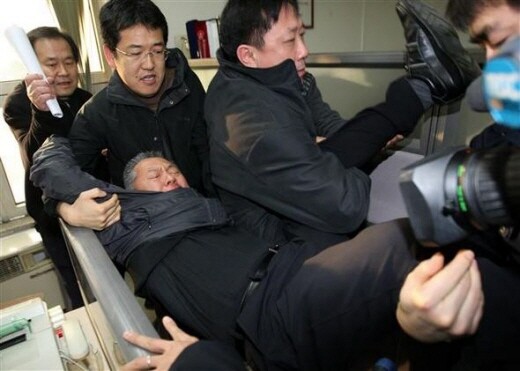hankyoreh
Links to other country sites 다른 나라 사이트 링크
[Analysis] Next steps for the Korean Confederation of Trade Unions

The Korean Confederation of Trade Unions (KCTU) is being forced to go on the defensive. The Korean Railway Workers’ Union (KRWU), one of the umbrella union’s primary sources of power, ended its strike Thursday without gaining any clear concessions, while the legal foundation for the Korean Government Employees’ Union (KGEU) remains unclear. Moreover, the possibility of the KCTU involving itself in labor policy formation has been shut off ever since the ruling Grand National Party (GNP), Ministry of Labor, Korea Employers Federation (KEF) and Federation of Korean Trade Unions (FKTU) have been involved in four-party talks while excluding KCTU from participating.
The Strategy to Exclude KCTU
The recent Lee administration response to pending labor issues appears to be intentionally aimed at excluding KCTU. It has responded rather unusually to the KRWU strike in a pan-government fashion, almost as if it were in a direct fight with the union. Police have been conducting surprise search and seizure raids, Ministers have been issuing joint statements related to the economy and labor issues, and President Lee Myung-bak has been making public statements about the illegality of strikes.
In addition, FKTU has broken off cooperative relations with KCTU and has entered into four-party talks over the largest of pending labor issues, including the multiple union system and the ban on the wage payments to full-time unionists. KCTU had been planning on forming an agenda on major labor issues in solidarity with FKTU, but that has become water under the bridge. It appears that the Lee administration’s siege on the KCTU is complete.
Setbacks during the winter struggle?Accordingly, the possibility is growing that labor’s big winter struggle set for December may be going nowhere. As FKTU switches its strategies from strikes to negotiations, whether it will maintain plans for participation in a general strike has become unclear. What now remains is that the KCTU may launch a strike on its own, however, the umbrella union’s ability to organize on the ground among its member unions has been deteriorating. The election of a new KCTU chairman is set for next month, and each individual member union is going into election mode.
The overarching theme in the recent labor struggle has been intense pressure by the Lee administration, symbolized by the termination of the KRWU strike. Lee Byeong-hun, chairman of the labor committee of the People’s Solidarity for Participatory Democracy (PSPD), said PSPD had hoped the strike would be resolved positively with the Lee administration correcting its misguided labor policies, but instead, the situation has become more disheartening. Lee added, "Accordingly, unions under the KCTU umbrella are contracting."
KCTU, meanwhile, appears unconcerned. Lee Su-bong, spokesman for KCTU, said KCTU will use the case of KRWU as an opportunity for KCTU to prepare themselves for what might be further pressure from the administration. On Dec. 12, KCTU will hold a rally to oppose the Lee government’s repression of government employees and public sector unions. In addition, on Dec. 16, they plan to hold a 10 thousand-person demonstration in Seoul.
Analysts say whether the Lee government is able to pass revisions to the Labor Union Law pertaining to pending issues, including the multiple union system and ban on wages to full-time union activists, will serve as the watershed in the labor struggle. The Korean Metal Workers’ Union (KMWU), one of KCTU’s core unions, released a statement Friday saying that if the Lee administration starts the ban on wages to full-time unionists in large workplaces, some 90 thousand employees at Hyundai, Kia and GM Daewoo will respond with a general strike.
Please direct questions or comments to [englishhani@hani.co.kr]
Editorial・opinion
![[Column] Season 2 of special prosecutor probe may be coming to Korea soon [Column] Season 2 of special prosecutor probe may be coming to Korea soon](https://flexible.img.hani.co.kr/flexible/normal/500/300/imgdb/original/2024/0426/3317141030699447.jpg) [Column] Season 2 of special prosecutor probe may be coming to Korea soon
[Column] Season 2 of special prosecutor probe may be coming to Korea soon![[Column] Park Geun-hye déjà vu in Yoon Suk-yeol [Column] Park Geun-hye déjà vu in Yoon Suk-yeol](https://flexible.img.hani.co.kr/flexible/normal/500/300/imgdb/original/2024/0424/651713945113788.jpg) [Column] Park Geun-hye déjà vu in Yoon Suk-yeol
[Column] Park Geun-hye déjà vu in Yoon Suk-yeol- [Editorial] New weight of N. Korea’s nuclear threats makes dialogue all the more urgent
- [Guest essay] The real reason Korea’s new right wants to dub Rhee a founding father
- [Column] ‘Choson’: Is it time we start referring to N. Korea in its own terms?
- [Editorial] Japan’s rewriting of history with Korea has gone too far
- [Column] The president’s questionable capacity for dialogue
- [Column] Are chaebol firms just pizza pies for families to divvy up as they please?
- [Column] Has Korea, too, crossed the Rubicon on China?
- [Correspondent’s column] In Japan’s alliance with US, echoes of its past alliances with UK
Most viewed articles
- 1‘We must say no’: Seoul defense chief on Korean, USFK involvement in hypothetical Taiwan crisis
- 2N. Korean delegation’s trip to Iran shows how Pyongyang is leveraging ties with Moscow
- 3[Column] Season 2 of special prosecutor probe may be coming to Korea soon
- 4‘Weddingflation’ breaks the bank for Korean couples-to-be
- 5[Column] Has Korea, too, crossed the Rubicon on China?
- 6[Editorial] New weight of N. Korea’s nuclear threats makes dialogue all the more urgent
- 7[Reportage] On US campuses, student risk arrest as they call for divestment from Israel
- 8Korea sees more deaths than births for 52nd consecutive month in February
- 9[Column] Park Geun-hye déjà vu in Yoon Suk-yeol
- 10[Guest essay] The real reason Korea’s new right wants to dub Rhee a founding father